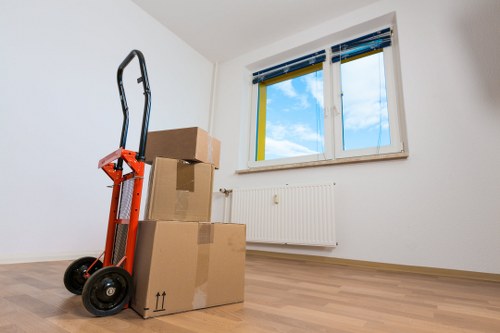Bulk Waste Collection Central London

Living in Central London often means dealing with limited space, especially when it comes to waste disposal. Bulk waste, such as old furniture, appliances, and renovation debris, can be a hassle to manage. Understanding the options and services available for bulk waste collection in Central London can make this process easier and more efficient.
Bulk waste collection is essential for maintaining the cleanliness and functionality of our urban environment. It helps in reducing clutter, preventing health hazards, and promoting recycling and disposal in an environmentally friendly manner. Whether you’re moving, renovating, or simply decluttering, knowing how to handle bulk waste is crucial.
This article explores the various aspects of bulk waste collection in Central London, including available services, guidelines, costs, and tips for efficient disposal. We also highlight the nearby areas served by these services, ensuring that residents across Central London can manage their bulk waste effectively.

Understanding Bulk Waste Collection
Bulk waste refers to large items that cannot be disposed of through regular household waste collection. This includes furniture, large appliances like refrigerators and washing machines, garden waste, and construction debris. Proper disposal of bulk waste is important to maintain public health and environmental standards.
In Central London, bulk waste collection is typically managed by local councils or private waste management companies. These services ensure that bulk waste is collected, transported, and disposed of or recycled appropriately.
Understanding the regulations and guidelines around bulk waste collection can help residents avoid fines and ensure that their waste is handled responsibly. It’s important to know what items are accepted, how to prepare them for collection, and any associated costs.

Bulk Waste Collection Services
Local Council Services
Many of Central London's local councils offer bulk waste collection services. These services are often free of charge or available for a nominal fee. To arrange for bulk waste collection, residents usually need to book a collection date in advance.
Services provided by local councils may include:
- Scheduled bulk waste pickups
- Support for recycling and environmentally friendly disposal
- Guidance on what items can and cannot be collected
Private Waste Management Companies
For those who prefer more flexible or immediate services, private waste management companies offer bulk waste collection. These companies provide tailored solutions based on individual needs, including same-day or next-day pickups.
Advantages of using private companies include:
- Flexible scheduling
- Specialized services for different types of waste
- Additional services like recycling and disposal options
While private services may come at a higher cost compared to local council services, the added convenience and customization can be worth the price for many residents.

Guidelines for Bulk Waste Collection
To ensure smooth bulk waste collection, it’s important to follow certain guidelines. These guidelines help waste collectors handle items safely and efficiently, minimizing disruptions to your daily life.
Preparing Your Bulk Waste
Proper preparation of your bulk waste items is essential. Here are some steps to follow:
- Sort Your Waste: Separate recyclable materials from non-recyclable ones. This helps in efficient processing and reduces environmental impact.
- Disassemble Large Items: If possible, disassemble large items like furniture to make them easier to transport and handle.
- Secure Your Waste: Ensure that all items are securely packed to prevent damage or injury during collection and transportation.
- Schedule a Pickup: Book your collection in advance with either your local council or a private waste management company.
What Can and Cannot Be Collected
Different services have varying guidelines on what items they can collect. Commonly accepted bulk waste items include:
- Old furniture
- Electronics and appliances
- Garden waste
- Construction debris
Items typically not accepted include:
- Hazardous materials (e.g., paint, chemicals)
- Medical waste
- Electronic waste with hazardous components (unless specified)

Costs of Bulk Waste Collection
The cost of bulk waste collection in Central London varies depending on the service provider and the volume of waste. Local council services are often more affordable, with some offering free collections for certain items or limited quantities per year.
Private waste management companies may charge based on the weight or volume of the waste, the type of items, and the urgency of the collection. It’s advisable to compare prices and services from different providers to find the best option for your needs.
Factors Influencing Costs
- Type of Waste: Some materials may require special handling or recycling, affecting the overall cost.
- Volume and Weight: Larger and heavier items generally cost more to collect and dispose of.
- Scheduling: Same-day or urgent collections often come at a premium price.
- Recycling Requirements: Services that focus on recycling may have different pricing structures.
Cost-Saving Tips
To minimize costs, consider the following tips:
- Combine multiple items into a single collection to avoid multiple fees.
- Take advantage of free bulk waste collections offered by your local council.
- Properly sort and prepare your waste to reduce handling and processing fees.
- Look for discounts or special offers from private waste management companies.

Environmental Impact
Responsible bulk waste collection plays a significant role in environmental conservation. By ensuring that waste is properly sorted and recycled, the amount of material sent to landfills is reduced, lowering greenhouse gas emissions and conserving natural resources.
Recycling and Reuse
Many bulk waste collection services prioritize recycling. Items like metal, glass, plastic, and certain electronics can be recycled, reducing the need for new raw materials. Reuse initiatives, such as donating old furniture or appliances, also contribute to environmental sustainability.
Reducing Landfill Waste
Proper bulk waste disposal minimizes the strain on landfill sites. Central London, being densely populated, benefits greatly from efficient waste management practices that keep landfill usage in check and promote a cleaner, healthier urban environment.
Community Benefits
Effective bulk waste collection also enhances community well-being by keeping streets clean and reducing the risk of pest infestations and other health hazards associated with unmanaged waste.

Tips for Efficient Bulk Waste Collection
Managing bulk waste efficiently can save time, money, and effort. Here are some practical tips to help you streamline the process:
Plan Ahead
Before generating bulk waste, plan how you will dispose of it. This includes identifying the items you need to dispose of and researching the best disposal options available.
Regular Decluttering
Regularly decluttering your home or workspace can prevent the accumulation of bulk waste. This makes it easier to manage waste as it is generated, rather than dealing with large piles later.
Use Reusable Containers
When sorting and preparing your bulk waste, use sturdy, reusable containers to organize different types of waste. This simplifies the collection process and ensures that items are handled correctly.
Collaborate with Neighbors
Coordinate with your neighbors to arrange bulk waste collections. This can help in sharing costs and making the process more efficient.

Technology and Innovations in Bulk Waste Collection
The bulk waste collection industry is evolving with the introduction of new technologies and innovative practices. These advancements aim to enhance efficiency, reduce environmental impact, and improve the overall user experience.
Smart Collection Scheduling
Many waste management companies now use smart scheduling systems that optimize collection routes and times based on real-time data. This reduces fuel consumption, lowers operational costs, and ensures timely pickups.
Advanced Recycling Techniques
Modern recycling facilities employ advanced techniques to sort and process bulk waste more effectively. Automated sorting systems and better recycling processes increase the percentage of waste that can be recycled, further minimizing landfill use.
Electric and Eco-Friendly Vehicles
To reduce the carbon footprint of waste collection, some companies are adopting electric or hybrid vehicles. These eco-friendly options contribute to a cleaner environment and showcase commitment to sustainable practices.
Mobile Apps for Waste Management
Mobile applications are becoming popular tools for managing bulk waste collection. These apps allow users to schedule pickups, track collection status, and receive updates, making the process more convenient and user-friendly.

Challenges in Bulk Waste Collection
Despite advancements, bulk waste collection in Central London faces several challenges. Addressing these issues is essential for maintaining effective waste management systems.
Space Constraints
Central London is densely populated with limited space for waste storage and processing. This can lead to difficulties in handling large volumes of bulk waste efficiently.
Traffic and Accessibility
Narrow streets and heavy traffic can hinder waste collection trucks, causing delays and increasing operational costs. Ensuring accessibility for waste collection vehicles is a persistent challenge.
Environmental Regulations
Stringent environmental regulations require waste management companies to adhere to strict guidelines, which can be costly and complex to implement.
Public Awareness
Educating the public about proper bulk waste disposal methods is crucial. Lack of awareness can lead to improper disposal practices, negatively impacting the environment and community health.

Future of Bulk Waste Collection in Central London
The future of bulk waste collection in Central London looks promising with ongoing innovations and a growing emphasis on sustainability. Here are some trends to watch:
Increased Recycling Efforts
As environmental concerns rise, bulk waste collection services are likely to focus more on recycling and sustainable disposal methods. This includes expanding recycling facilities and improving sorting technologies.
Automation and AI
Artificial intelligence and automation will play a larger role in optimizing waste collection routes, predicting waste generation patterns, and improving overall efficiency.
Community Engagement
Greater community engagement and education initiatives will help promote responsible waste disposal practices, ensuring that bulk waste collection systems are supported and utilized effectively.
Integration with Smart Cities
As London continues to develop into a smart city, bulk waste collection will integrate with other smart infrastructure systems. This integration will enhance real-time monitoring, data analysis, and resource management.
Sustainable Practices
Adopting more sustainable practices, such as using renewable energy sources for waste collection vehicles and increasing the use of biodegradable materials, will be key to the future of bulk waste management.

Bulk Waste Collection in Nearby Areas
Central London is surrounded by several neighborhoods and districts that also require efficient bulk waste collection services. Each area has its unique features and demands, contributing to the overall waste management landscape.
Westminster
Located just west of Central London, Westminster is home to many iconic landmarks. Bulk waste collection here focuses on maintaining the cleanliness of tourist hotspots and residential areas alike.
Camden
Camden, known for its vibrant markets and cultural diversity, requires bulk waste services that can handle both residential and commercial waste efficiently.
Islington
Islington blends residential charm with bustling commercial areas. Bulk waste collection services here prioritize timely pickups to accommodate the mixed-use environment.
Kensington and Chelsea
This affluent area demands high standards in waste collection, with an emphasis on recycling and eco-friendly disposal methods to match the community’s values.
City of London
The financial heart of London, the City of London, has specific bulk waste needs, particularly for office renovations and commercial cleanouts.
Greenwich
Greenwich, with its historical sites and residential neighborhoods, benefits from bulk waste collection services that respect the area's heritage and environmental significance.
Hackney
Hackney’s diverse population and active community spaces require robust bulk waste collection systems to manage various types of waste effectively.
Hammersmith and Fulham
This area combines residential tranquility with vibrant commercial districts, necessitating flexible bulk waste collection services.
Southwark
Southwark’s mix of residential, commercial, and historic sites demands comprehensive bulk waste management solutions to cater to its diverse needs.
Wandsworth
Wandsworth’s expansive residential areas require regular bulk waste collection to maintain the cleanliness and order of its neighborhoods.
Brent
Located northwest of Central London, Brent’s varied communities benefit from efficient bulk waste services that address both urban and suburban waste collection challenges.
Richmond upon Thames
Richmond upon Thames, known for its parks and riverside locales, emphasizes eco-friendly bulk waste collection to preserve its natural beauty.
Ealing
Ealing’s residential and commercial blend requires a versatile bulk waste collection approach to handle different types of waste effectively.
Waltham Forest
Waltham Forest’s growing population and expanding infrastructure necessitate scalable bulk waste collection services to meet increasing demands.
Haringey
Haringey’s dynamic neighborhoods and active community life require consistent and reliable bulk waste collection to support its residents and businesses.
Conclusion
Bulk waste collection in Central London is a vital service that supports the city’s cleanliness, environmental sustainability, and overall quality of life. By understanding the available services, guidelines, and costs, residents can manage their bulk waste more effectively.
With ongoing innovations and a strong focus on recycling and sustainability, the future of bulk waste collection looks promising. Additionally, the coverage of nearby areas ensures that the entire Central London region benefits from efficient and responsible waste management practices.
Whether you’re a resident looking to declutter or a business managing renovation waste, knowing your options and following best practices will help you contribute to a cleaner, greener London.
Frequently Asked Questions
- What items are considered bulk waste?
Bulk waste includes large items such as old furniture, appliances, garden waste, and construction debris that cannot be disposed of through regular household waste collection.
- How can I arrange for bulk waste collection in Central London?
You can arrange bulk waste collection by contacting your local council or hiring a private waste management company. It’s advisable to book in advance to ensure timely pickup.
- Are there any costs associated with bulk waste collection?
Costs vary depending on the service provider and the volume of waste. Local councils may offer free or nominal fee services, while private companies may charge based on weight, volume, and urgency.
- Can I recycle bulk waste items?
Yes, many bulk waste items can be recycled. It’s important to separate recyclable materials from non-recyclable ones and ensure they are prepared according to the recycling guidelines.
- What should I do with hazardous bulk waste?
Hazardous bulk waste, such as chemicals and medical waste, should not be disposed of through regular bulk waste collection services. Contact specialized hazardous waste disposal services for proper handling and disposal.